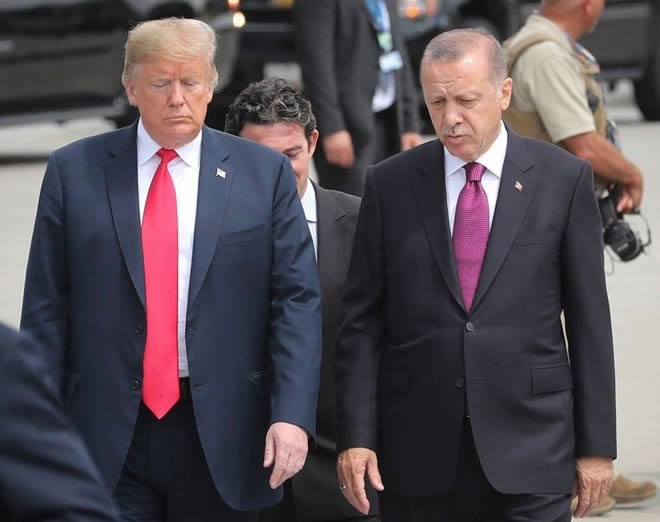By Matthew Bryza
Thursday August 16, 2018

President Trump and Turkey’s president, Recep Tayyip Erdogan, at the NATO summit in Brussels in July. (Olivier Hoslet/EPA-EFE)
President Trump’s decision to double steel and aluminum tariffs on Turkey — and reports that broader sanctions are being considered — mark a dangerous escalation.
This was an unprecedented hostile act against a NATO ally, timed to inflict maximum damage. Turkey is already struggling to stem the collapse of its currency, and Trump announced the tariffs precisely when Turkey’s minister of finance was delivering a crucial speech outlining his government’s plan for managing the country’s economic crisis.
What’s more, these “large sanctions,” as Trump has described them, essentially blew up a delicate negotiating process between Ankara and Washington that was on the verge of success. An agreement was within reach, according to which Turkey would have freed American Pastor Andrew Brunson from house arrest. But Trump apparently lost patience and decided to turn up the heat rather than negotiate to a successful conclusion, resorting to what President Recep Tayyip Erdogan has termed “economic warfare.”
By publicly backing the Turkish leader into a corner, Trump has made it significantly more difficult for Erdogan to agree to Brunson’s release. Indeed, Erdogan’s defiant stance is the only thing he has done in recent years that enjoys virtually unanimous support across Turkey’s political spectrum. And, by trying to damage the already-fragile Turkish economy, the U.S. president is kicking a friend when he is down. It seems the White House has decided to give up on Turkey as an ally.
Abandoning Turkey now would weaken NATO, forfeit U.S. influence in the Middle East and threaten the coalition whose fight against ISIS is far from finished. Recent reports suggest that the terrorist network is trying to make a serious comeback.
It could also drive Turkey into the arms of Russia, whose strategic goal in the region has long been to drive a wedge between Turkey and the rest of NATO, especially with Washington. A top Kremlin adviser has openly admitted this.
While the U.S. alliance with Turkey has been central to our Middle East strategy since the Truman administration, the Russians are working overtime to change this power balance.
Moscow wants a Middle East with a diminished Western presence. Key to Putin’s approach is sidelining the United States and empowering Iran. Casting Turkey loose now would give the Kremlin exactly what it wants and make it impossible to pursue diplomatic solutions in Syria and Iraq.
Let’s remember: The United States has a lot at stake in the future of Turkey.
Take Turkey’s Incirlik Air Base as an example. It is the most important overseas military base that most Americans have probably never heard of. As a diplomat who spent 13 of my 23 years in the U.S. Foreign Service covering the region, I have seen how indispensable the base is.
It has been ground zero for the war on ISIS. Strike missions flying out of the base dropped on average 180 bombs a day on ISIS targets at the peak of the fight against the terrorist group. Congress reaffirmed Incirlik’s importance to U.S. national security in December when it approved more than $48 million in upgrades to the base.
The base is crucial. While ISIS is on the retreat, the war is far from over. The group is breaking up into new and dangerous pieces.
Alarming new reports suggest that ISIS fighters have gone into hiding near Damascus and in Syria’s northwest region of Idlib, on the border with Turkey, and are awaiting orders. Others have defected to al-Qaeda’s branch in Syria, which has been gaining strength while ISIS fighters have scattered.
More generally, U.S. national interests in the Middle East will be far better served by partnering with a NATO ally that borders Syria, Iraq and Iran, rather than by crippling that country’s struggling economy. Moreover, if Turkey’s economy were to collapse, the U.S.’s vital strategic interests would eventually and inevitably drive it to help pick up the economic pieces
—
Matthew Bryza is a nonresident senior fellow at the Atlantic Council and worked on Turkey policy at the National Security Council and State Department.
This article was originally published in The Washington Post